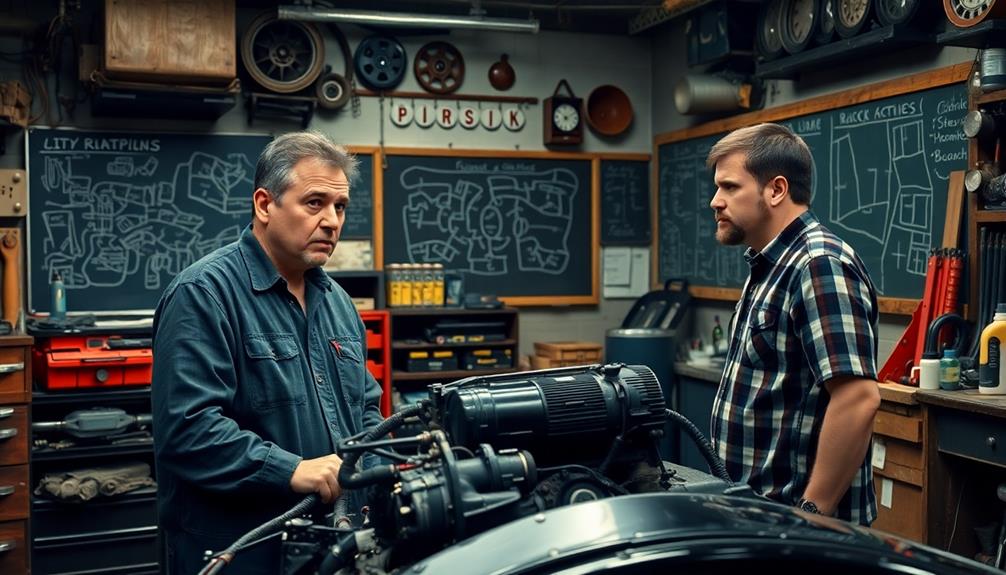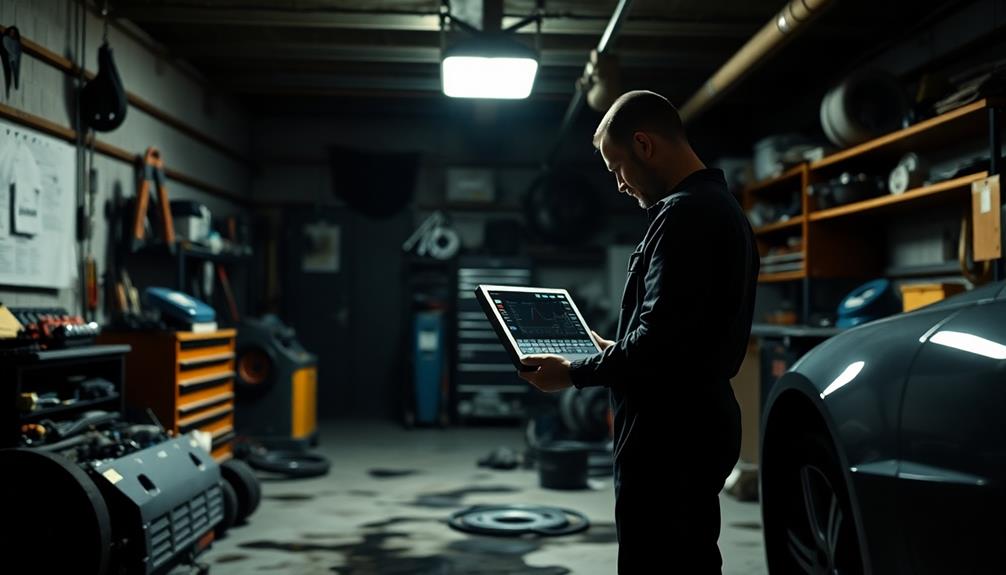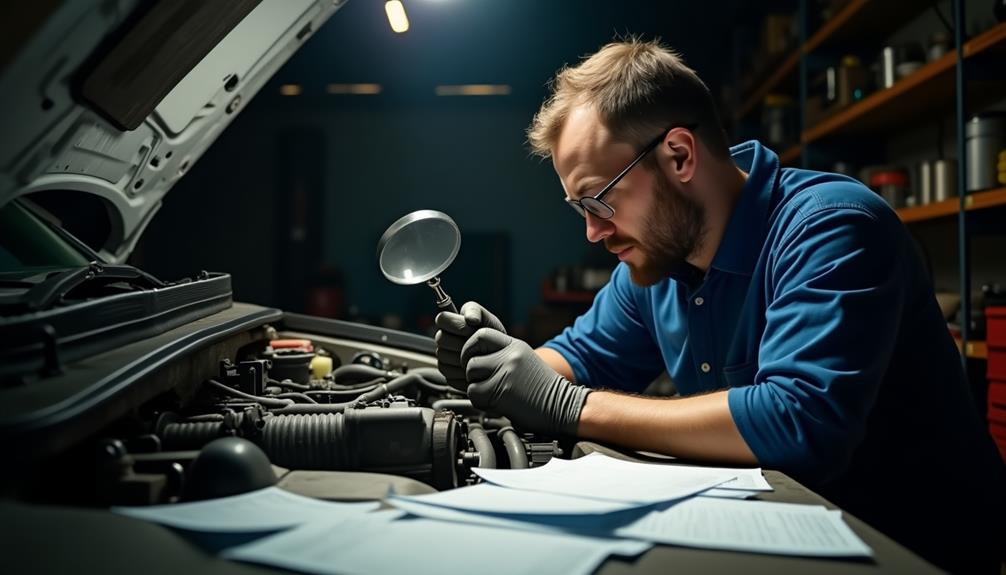You might be surprised at the questions mechanics often dread but have to address. "Why are repairs so expensive?" is a tough one, especially when parts and labor costs keep rising. You might also ask, "Why did this issue happen?" since hidden problems can complicate repairs. Mechanics can't guarantee every job due to unpredictable vehicle issues, which can frustrate you. Plus, long wait times for parts often lead to dissatisfaction. Understanding these challenges can help you navigate the repair process better. Stick around, and you'll discover more insights that reveal the truth behind your car's maintenance needs.
Key Takeaways
- "Why is the repair cost so high?" can be frustrating as mechanics must explain rising parts and labor expenses.
- "Is this repair really necessary?" challenges mechanics to justify essential repairs against customer skepticism.
- "Can you guarantee this repair will fix the issue?" puts pressure on mechanics due to unpredictable vehicle problems and hidden issues.
- "Why is this taking so long?" can be tough to answer when supply chain issues delay parts availability.
- "What if I don't do this repair?" forces mechanics to convey potential risks and future costs of neglecting maintenance.
Why Are Repairs So Expensive?
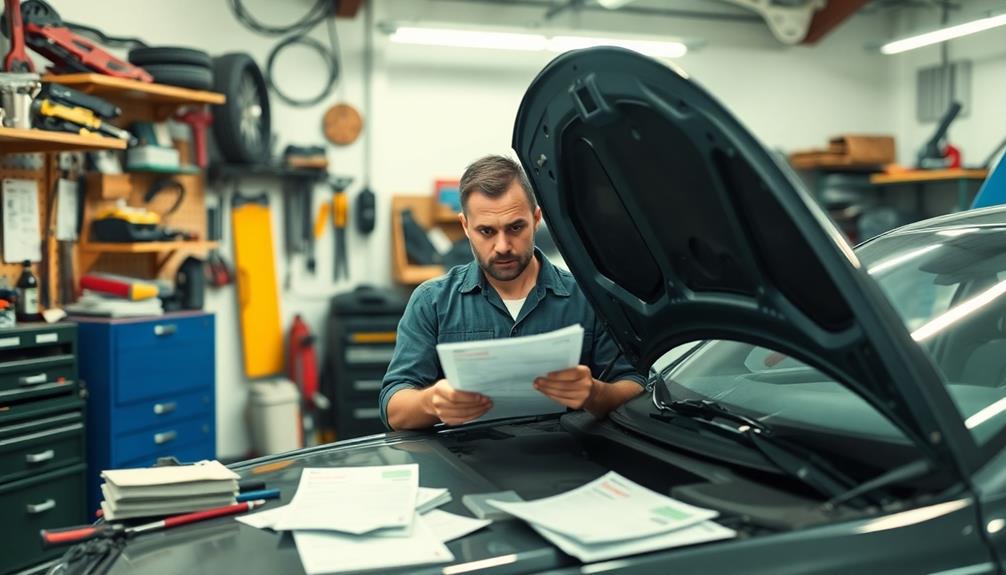
When you take your car in for repairs, you might be shocked by the bill. It's becoming increasingly common for repair costs to skyrocket, often leaving you wondering why. One reason is the rising costs of parts and labor; every time you visit a mechanic, you may face higher expenses.
For instance, repairs on older vehicles like a 2008 Pathfinder can hit $6,400, or a 2002 Isuzu Axiom might run you $5,500—totally exceeding the vehicle's market value. In addition, modern vehicles like the 2024 GMC Sierra may require specialized GMC tuning to enhance performance, which can add to repair costs.
Modern cars are more complex than ever, filled with intricate electronics and sensors. This complexity requires specialized knowledge, which can drive up diagnostic fees and labor costs considerably.
Moreover, if you own a high-mileage vehicle, routine maintenance often uncovers hidden issues, leading to unexpected repairs that escalate quickly.
All these factors can strain your budget considerably. If you're driving an older model, ongoing maintenance costs can become a long-term financial challenge, making every repair visit a source of anxiety.
Understanding why repairs are so expensive can help you prepare for these costs before you pull into the shop.
What's Wrong With My Car?

Identifying what's wrong with your car can often feel like searching for a needle in a haystack. With today's complex technology, diagnosing issues can be a real challenge.
Mechanics frequently encounter high-mileage vehicles, where hidden problems complicate repairs and drive up costs. Many consumers aren't aware of their vehicle's maintenance needs, leading to unexpected engine failures.
Regular maintenance, similar to the upkeep of an air purifier, can considerably reduce the likelihood of major repairs.
Consider these common signs your car might need attention:
- Strange noises: Clicking or grinding can indicate serious issues.
- Warning lights: Dashboard alerts aren't just for decoration; they signal problems.
- Poor performance: Sluggish acceleration or stalling could mean your engine's in trouble.
- Fluid leaks: Puddles under your car often point to leaks that need urgent care.
Frustration can grow when you feel uninformed about recalls or necessary repairs, negatively impacting your customer experience.
Mechanics stress the importance of routine maintenance, yet many drivers overlook it, potentially resulting in severe issues and expensive repairs down the line.
How Often Should I Maintain It?
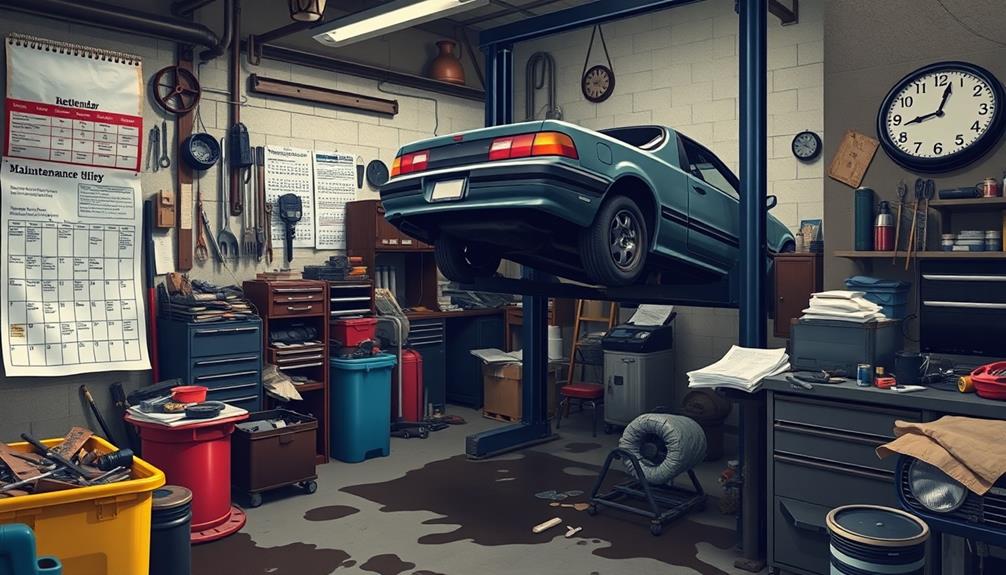
Maintaining your car is vital to keeping it running smoothly and preventing costly repairs. So, how often should I maintain it? Routine maintenance is key. Mechanics typically recommend oil changes every 5,000 to 7,500 miles. This not only guarantees engine longevity but also saves you time in the long run by preventing more severe issues.
Don't forget about tire rotations, which should be done every 6,000 to 8,000 miles. This promotes even wear and extends the life of your tires, allowing you to get the most out of your investment.
Air filters need replacing every 15,000 to 30,000 miles; clean filters improve engine efficiency and fuel economy. Checking your brake fluid regularly is essential as well. You should change it every 2 to 3 years for peak braking performance.
Finally, spark plugs generally need replacement every 30,000 to 100,000 miles, depending on your vehicle. By sticking to these maintenance schedules, you're not just preserving your car's health; you're also saving time and money in the future.
Why Did This Issue Happen?

Many drivers are surprised to find that issues with their vehicles often stem from a lack of routine maintenance. You might think a few skipped oil changes won't hurt, but neglecting regular checks can lead to serious problems. It's hard to say just how much a lack of upkeep can cost you down the road.
Here are some common reasons why issues crop up:
- High mileage wear and tear can lead to engine failures.
- Complex modern engines have electronic systems that can fail.
- Design flaws in engines, like GM's 4.3-liter Vortec, cause repeated issues.
- Misconceptions about repair costs create disbelief when bills arrive.
These factors compound over time, and if you don't address them early, you could face expensive repairs that exceed your car's value.
Mechanics often encounter frustrated owners who can't understand why their vehicles are failing. It's essential to recognize that many problems are preventable with proper maintenance. Ignoring the basics can turn minor issues into major headaches, leaving you to wonder, "Why did this issue happen?"
Regular checks not only keep your car running smoothly but also save you from unexpected financial strain.
Is My Car Worth Repairing?
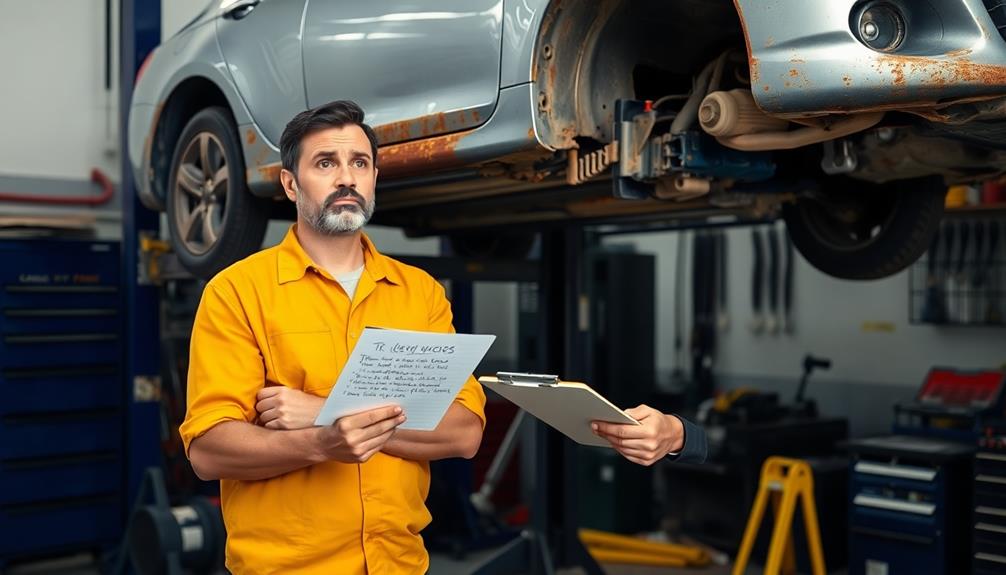
When faced with a hefty repair bill, it's natural to wonder if your car is worth fixing. Start by comparing the repair costs to your vehicle's market value. Sometimes, costs can exceed the worth of the car, making you rethink your investment. For instance, repairs for a 2008 Pathfinder could hit $6,400, while a 2002 Isuzu Axiom might need $5,500 just for an engine replacement.
| Repair Cost | Vehicle Value | Decision |
|---|---|---|
| $6,400 | $4,500 | Consider replacing |
| $5,500 | $6,000 | Worth repairing |
| $2,000 | $3,000 | Definitely repair |
Make sure to evaluate your vehicle's overall condition, especially if it has high mileage. Hidden issues can arise during repairs, which could lead to further costs. Emotional attachments can tempt you to invest in repairs, but be realistic about the long-term implications. Remember, well-maintained older cars might be more cost-effective to fix than newer models with complex designs. So, weigh your options carefully before making a decision.
Can You Guarantee This Repair?

When you ask, "Can you guarantee this repair?" you're tapping into a complex issue.
Mechanics often face repair limitations due to the unpredictable nature of vehicle problems and how they can be intertwined.
Understanding warranty coverage and trusting your mechanic's expertise is key to managing your expectations.
Repair Limitations Explained
In the world of auto repair, you might find that mechanics often can't guarantee specific repairs. This uncertainty stems from various factors that influence the repair process. While they aim to provide pretty good service, the unpredictable nature of vehicle wear and tear can complicate things.
Here are a few reasons why:
- Hidden Issues: High mileage vehicles may have underlying problems that aren't apparent until you dig deeper.
- Complex Technology: Modern cars feature intricate electronic systems, which can drive up repair costs and make diagnosis tricky.
- Parts Reliability: Mechanics often source parts from different vendors, and the quality can vary, affecting repair success.
- Market Value Decisions: Sometimes, extensive repairs might exceed the vehicle's market value, forcing tough choices about whether to fix or replace it.
Given these challenges, mechanics can't always provide absolute guarantees. They do their best to inform you about potential risks and outcomes, but it's vital to understand that the nature of auto repair can be unpredictable.
Your vehicle's health hinges on many factors, making guarantees a tricky business.
Warranty Coverage Insights
Many car owners assume that repairs will be guaranteed under warranty, but that's not always the case. Warranty coverage can greatly vary by manufacturer, and many modern vehicles come with limited warranties covering specific repairs for a set number of years or miles.
It's essential to understand that warranties typically exclude wear-and-tear items, like brake pads and tires, which can lead to confusion about what repairs might be covered.
Mechanics often feel frustrated when customers expect certain repairs to fall under warranty, especially when there's a lack of prior maintenance records or if modifications have been made to the vehicle. Some warranties do offer "powertrain" coverage, which protects essential components like the engine and transmission, but exclusions can apply based on the repair's nature.
To navigate warranty coverage effectively, you should familiarize yourself with the specific details of your warranty. Many repairs may require you to provide documentation showing that routine maintenance was performed according to the manufacturer's guidelines.
If not, you risk voiding your warranty, leaving you responsible for unexpected repair costs. Always ask questions to clarify what's covered before assuming any repair will be guaranteed.
Trusting Mechanic Expertise
Trusting a mechanic's expertise can feel intimidating, especially with the complexities of modern vehicles. When you ask, "Can you guarantee this repair?" remember that mechanics often face skepticism. The reality is that today's vehicles are intricate, making absolute guarantees nearly impossible.
Consider these factors that affect trusting mechanic expertise:
- High-tech sensors that control everything from navigation to safety systems
- Expensive parts that may not always be readily available
- Labor costs that reflect specialized knowledge and skill
- Routine maintenance that, if overlooked, compromises repair outcomes
It's important to understand that mechanics aim for transparency in their work. Many customers lack a basic understanding of how these systems operate, leading to unrealistic expectations.
Trust issues are compounded by negative stereotypes, making it essential for you to communicate openly with your mechanic.
Why Are Parts Taking So Long?

You might be wondering why your car parts are taking forever to arrive.
Supply chain issues and increased demand for repairs have created a perfect storm, leaving mechanics waiting longer than ever.
As the complexity of vehicles grows, sourcing specific parts quickly is becoming increasingly difficult.
Supply Chain Issues
Often, customers find themselves frustrated when their vehicles sit idle for weeks or even months due to supply chain issues.
These supply chain disruptions have been worsened by global events, causing significant delays in obtaining essential automotive parts. You might be wondering why this is happening, and here are some key factors at play:
- Semiconductor shortages affecting modern vehicle production
- Bottlenecks in sourcing materials, leading to increased costs
- The complexity of modern vehicles relying on specialized components, such as those requiring performance tuning
- Mechanics often waiting weeks or months for parts to arrive
Each of these factors contributes to the extended repair timelines you're experiencing.
Mechanics are often left in the lurch, unable to provide timely service because the parts simply aren't available. The reliance on advanced technology in vehicles makes it even more difficult to find replacements quickly.
When your car's in the shop, it's not just a minor inconvenience; it's a major disruption to your daily life. Understanding these supply chain disruptions can help you grasp why your mechanic may struggle to give you a precise timeline for your vehicle's repairs.
Increased Demand Factors
In today's automotive landscape, the demand for repair parts often outstrips supply, leading to frustrating delays. Increased demand factors play a significant role in this issue. Rising costs of parts and labor have made repairs more expensive, causing many drivers to delay maintenance. As a result, when repairs are finally needed, the rush for parts can overwhelm supply chains.
Additionally, modern vehicles' reliance on specialized electronics and advanced technology creates a scarcity of specific replacement parts. Mechanics often face prolonged downtime because diagnosing issues in these vehicles requires waiting for components that can take weeks or even months to source.
Supply chain disruptions, fueled by global events and shifting consumer demands, further exacerbate these delays. The automotive industry's trend toward just-in-time inventory management means parts are rarely stockpiled, which leads to longer lead times when unexpected repairs pop up.
In short, if you're wondering why your repair is taking so long, consider these increased demand factors. They're not just a mechanic's excuse; they reflect a complex industry grappling with unprecedented challenges.
What Should I Do Next?
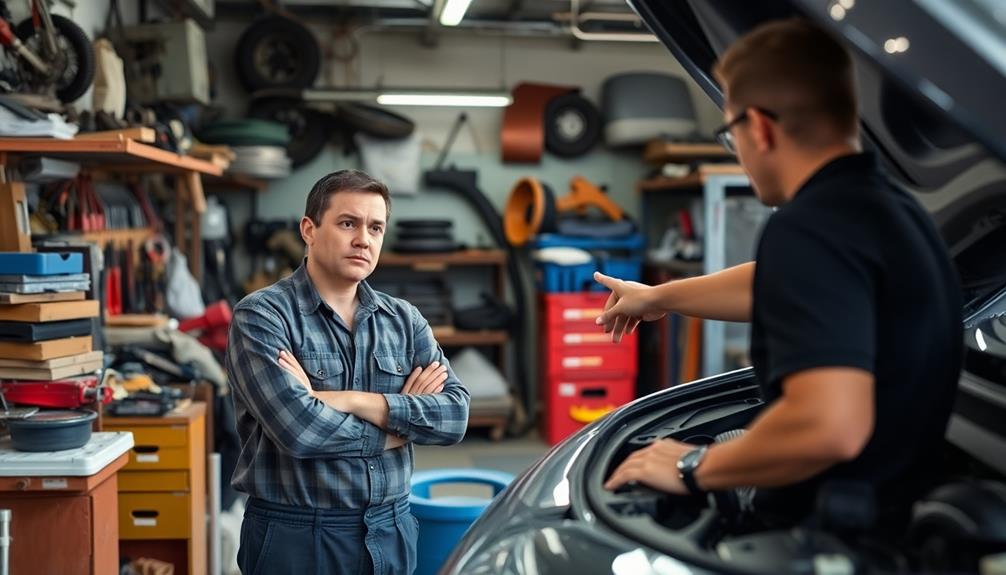
Taking charge of your vehicle's maintenance can seem intimidating, but knowing what to do next is essential for both your safety and your wallet.
So, what should you do next? Start by familiarizing yourself with your car's manual. Mechanics often find that nearly 15% of owners never read theirs, which leads to costly misunderstandings about upkeep.
Here's a quick checklist to help you get started:
- Check for recalls: Stay updated to avoid frustration and potential safety hazards.
- Prioritize routine maintenance: Simple tasks can prevent severe and expensive repairs down the road.
- Learn basic engine mechanics: Empower yourself with knowledge to build trust with your mechanic.
- Address performance issues promptly: Don't ignore warning signs; high repair costs can exceed your vehicle's value.
Frequently Asked Questions
Why Do Some Cars Require More Maintenance Than Others?
Some cars require more maintenance due to complex engineering, higher performance demands, or specific parts. You'll find that luxury or sports models often need frequent checks, while simpler vehicles typically have lower maintenance needs.
Can You Explain the Labor Costs Involved in My Repair?
Sure, labor costs in your repair might seem like a mystery, but they actually reflect the mechanic's expertise, shop overhead, and time spent. So, you're fundamentally paying for peace of mind—what a deal, huh?
How Do You Determine the Right Parts for My Vehicle?
To determine the right parts for your vehicle, we assess its make, model, and year. We also consider the specific issue and consult manufacturer specifications, ensuring you get the best quality and compatibility for your repair.
What Can I Do to Prevent Future Issues?
Preventing future issues is like guarding a treasure; you've gotta maintain your vehicle regularly, check fluid levels, and replace worn parts. Trust me, staying proactive now can save you from costly repairs later!
Why Are Some Repairs Covered Under Warranty and Others Are Not?
Some repairs are covered under warranty because they're caused by manufacturer defects, while others arise from wear and tear or misuse. Always check your warranty details to understand what's included and what's not.
Conclusion
Maneuvering car repairs can feel like wandering through a maze, but you don't have to face it alone. By understanding these tough questions mechanics often dread, you'll empower yourself to make informed decisions. Remember, staying proactive with maintenance can save you time and money in the long run. So, don't hesitate to ask your mechanic for clarity. With the right knowledge, you can steer your car troubles toward smoother roads ahead.
